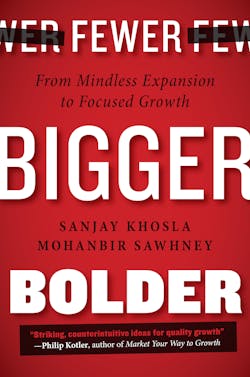Moving From Mindless Expansion to Focused Growth
Pushing into new markets and creating new product categories, while essential to a healthy bottom line, can often result in “mindless expansion” according to Sanjay Khosla, the former president of Kraft Foods International, and author of “Fewer, Bigger, Bolder.”
“Expansion can become addictive, and after a while companies tend to binge like junkies on product variants, brands, acquisitions and new markets,” Khosla explains.
The problem is that this leaves companies spread too thin. More importantly it leads to “stumbles from which it can take years to recover,” Khosla said. Some companies are recognizing this and taking action. For example P&G’s CEO A. G. Lafley announced earlier this month that it was conducting an overhaul of the company which could result in the number of brands being cut in half.
This action is exactly what Khosla and co-author Mohanbir Sawhney advocate as bold moves in order to move from the “seduction of more” to the “wisdom of less.” They have studied a number of companies over a number of years which resulted in the formulation of the Focus7 system which is a framework for achieving sustainable growth.
“Sustainable growth is growth you can maintain without twisting yourself into a pretzel each quarter to make your numbers; growth that produces decent margins; growth that makes organization charts subservient to profits and not the other way around; growth that favors simplicity over complexity,” the authors write.
One of the clever, yet practical, concepts of the system is called the Blank Check. And it’s exactly what Khosla used in correcting the stagnant position of the Oreo outside of the U.S. When he joined the company in 2007, the Oreo was basically the #1 biscuit in the world. That ranking was due to its #1 status in the U.S. for the past 100 years. Outside of the U.S. sales were stuck around $200 million. Using the black check concept, along with others strategies, sales rose to $1 billion in 2012.
The supporting belief of this concept is that innovation can be unlocked without anxiety around resources.
“Under the right circumstances and within a strategic framework, leaders should focus on defining ambitious goals and leave it to their managers and their teams to ask for whatever resources they need to achieve these goals. When teams decide their own budgets, they act as owners – in our experience it’s remarkable how often they are inspired to achieve outstanding results,” writes Khosla.
As these blank check projects are very time sensitive and run one, three or five years, it forces the group to key in on a few things and analyze what current resources are available, both within the company and outside.
This blank check theory can also work in the case of deciding where to locate facilities and how to manage the process. For example as companies increase their visibility in the ASEAN countries, as the ASEAN Economic Community (AEC) will begin in 2015, the planning is similar. Decisions need to be made as to what should be done locally and what needs to be done regionally. The team aspect of the strategy can be translated into the available supply chain partners. And the last step is to decide who will carry out which strategies.
To use Kraft as an example of deciding who will do what, Khosla explains that when the company was moving aggressively onto the global stage too many decisions were coming out of the Chicago headquarters. The voices of consumers in Germany or China weren’t being heard. So in the case of Oreo the decision about how to market the product in China was made by the Kraft China team that was able to take local knowledge and devise marketing and manufacturing strategies.
The key to the blank check project for any type of project, says Khosla, is for the core team of diverse members to work as a group, think big, test, learn and then adjust the scale. Many times the blank check ideas don’t work out, but failure is a valuable lesson Khosla says. In fact Khosla celebrates failures in the same manner as he does success.
This practical approach to solving issue is in fact the basis of the Focus7 which is comprised of the following principles;
Discovery – Key sources of insight includes: anomalies, confluence, frustrations, orthodoxies, extremities, voyages, and analogies.
Strategy -- There are eight key lenses through which you can focus the analysis of opportunities: offerings, brands, customers, partnership, channels, markets, monetization and processes.
Rallying Cry—A rallying cry serves five purposes – to explain, enumerate, emote, evoke and elevate.
People – To drive disproportionate growth, place big and bold bets on a few key people to lead the growth initiatives.
Execution – To speed up execution, stop doing marginal stuff—trim or eliminate initiatives that aren’t making substantial contributions and are sapping energy from executing on what really matters.
Organization – To align the organization with opportunities, consider creating a focused group that is expressly designed to pursue growth opportunities.
Metrics – Metrics need to be simple – measure only a few things that really matter so that people know what the game is and how you are keeping score.
“The Focus7 system is a very practical system that allow people to create bold, focused plans with equal opportunities for failure and success, “says Khosla, who used the system at Kraft with strong results. The Kraft Developing Markets grew from $5 billion in 2006 to $16 billion in 2012.
What is especially noteworthy of this grow is the quality of the growth, says Khosla. The company showed a significant improvement in profitability and cash flow; with profitability improving more than 50%. “These results in turn created a spirit of winning that served as a growth magnet for talent, which was essential to fuel continued growth.” At the end of the day, the core objective of the Focus7, and every company, is to sustain and accelerate profitable growth.


